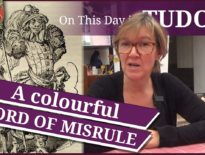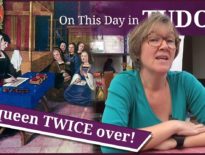On this day in Tudor history, 10th January 1532, Protestant martyr Thomas Dusgate, also known as Thomas Benet, was burned at the stake at Livery Dole in Heavitree, near Exeter.
Benet was a zealous Reformer and got into trouble when he posted anti-Catholic bills on Exeter Cathedral's door. He refused to recant, and it was said that "there never was so obstinate a heretic".
Find out about this Protestant reformer, who sought advice from Martin Luther regarding his trouble with lust, in today's talk.
Also on this day in Tudor history, 10th January 1480, the birth of Margaret of Austria. Find out more about this interesting Renaissance lady in last year's talk.
Also on this day in history:
- 1514 – Completion and printing of the first section of the “Complutensian NewTestament” in Hebrew, Aramaic, Greek and Latin at Alcala, Spain.
- 1603 – Probable date of death of Arthur Dent, religious writer and Church of England clergyman, from a fever. Dent's works included his “Sermon of Repentance”, “The Plaine-Mans Pathway to Heaven” and “The Ruine of Rome, or, An Exposition upon the Whole Revelation”.
Transcript:
On this day in Tudor history, 10th January 1532, Protestant martyr Thomas Dusgate, also known as Thomas Benet, was burned at the stake at Livery Dole in Heavitree, near Exeter.
In the Records of the City of Exeter is the following record of this execution:
“Md. that this present yere (23 Henry VIII, 1531–32) a little before Christmas their was one Thomas Benet that dwelled in the butcher row, was arrested by Mr. Mayor for heresy, and he was born at Cambridge and he was condemned by the Clergy to be burned for his opinions the 15 day of December, the year above written [i.e. 1531], and so he remained in the bishop prison until the 10th day of January [1532], that he was delivered by Chancel of the Church to Sir Thomas Denis, knight, then sheriff of Devonshire, and he would have burned the same heretic in Southinghay, Southernhay, and they had brought wood and put up a post, but he was compelled by Mr. Mayor and others to remove away the post and wood and so burned the heretic at Liverydole, where the place of execution for the sheriff is accustomed to be had.”
How did Thomas Benet or Dusgate come to this end?
Well, while he was studying at Cambridge, Thomas, who was an ordained priest, became friends with Reformer and preacher Thomas Bilney. This friendship led to Thomas also becoming a Reformer. After suffering problems with lust, “and stryvyng gretely to suppresse the same”, he travelled to the Continent to seek the advice of Reformer Martin Luther. Luther advised him to leave the priesthood and marry, which he did in 1524, as well as leaving Cambridge, where he’d been a fellow at Corpus Christi. He also changed his name from Dusgate to Benet, and moved to Devon. There, in Torrington and then Exeter, he kept a school for young children and taught.
In October 1531, his evangelical zeal led to him posting bills on Exeter Cathedral’s door, saying “The pope is antichrist; and we ought to worship God only, and no saints.” An investigation was launched into the writer of these bills, and Thomas was arrested and imprisoned. Martyrologist John Foxe records how a Grey Friar named Gregory Basset who “not long before, was revolted from the way of righteousness, to the way of Belial”, i.e. had recanted his reformed faith, tried to persuade Thomas to also recant but Thomas refused. Basset said of him “that there never was so obstinate a heretic.”
On 22nd December 1541, Thomas was tried, condemned for heresy and turned over to the secular powers. As the Records of the City of Exeter stated, the sheriff wanted him to be burned at Southernhay, but the mayor refused permission, so he was burned at Liverydole in Heavitree on either 10th or 15th January 1532.
Here is John Foxe’s account of his execution:
“The mild martyr, rejoicing that his end was approaching so near, as the sheep before the shearer, yielded himself with all humbleness to abide and suffer the cross of persecution. And being brought to his execution, in a place called Livery-dole, without Exeter, he made his most humble confession and prayer unto Almighty God, and requested all the people to do the like for him; whom he exhorted with such gravity and sobriety, and with such a pithy oration, to seek the true honouring of God, and the true knowledge of him; as also to leave the devices, fantasies, and imaginations of man's inventions, that all the hearers and beholders of him were astonied and in great admiration; insomuch that the most part of the people, as also the scribe who wrote the sentence of condemnation against him, did pronounce and confess that he was God's servant, and a good man.
Nevertheless two esquires, namely, Thomas Carew and John Barnehouse, standing at the stake by him, first with fair promises and goodly words, but at length through rough threatenings, willed him to revoke his errors, and to call to our Lady and the saints, and to say, I pray holy Mary, and all the saints of God, &c. To whom, with all meekness, he answered, saying, “No, no; it is God only upon whose name we must call; and we have no other advocate unto him, but only Jesus Christ, who died for us, and now sitteth at the right hand of his Father, to be an advocate for us; and by him must we offer and make our prayers to God, if we will have them to take place and to be heard.” With which answer the aforesaid Barnehouse was so enkindled, that he took a furze-bush upon a pike, and having set it on fire, he thrust it unto his face, saying, “Ah! wh*reson heretic! pray to our Lady, and say, Holy Mary, pray for us, or, by God's wounds, I will make thee do it.” To whom the said Thomas Benet, with a humble and a meek spirit, most patiently answered, “Alas, sir! trouble me not”. And holding up his hands, he said, “Father, forgive them.” Whereupon the gentlemen caused the wood and furzes to be set on fire, and therewith this godly man lifted up his eyes and hands to heaven, saying, “O Lord, receive my spirit.” And so, continuing in his prayers, did never stir nor strive, but most patiently abode the cruelty of the fire, until his life was ended. For this the Lord God be praised, and send us his grace and blessing, that at the latter day we may with him enjoy the bliss and joy provided and prepared for the elect children of God.”



Leave a Reply